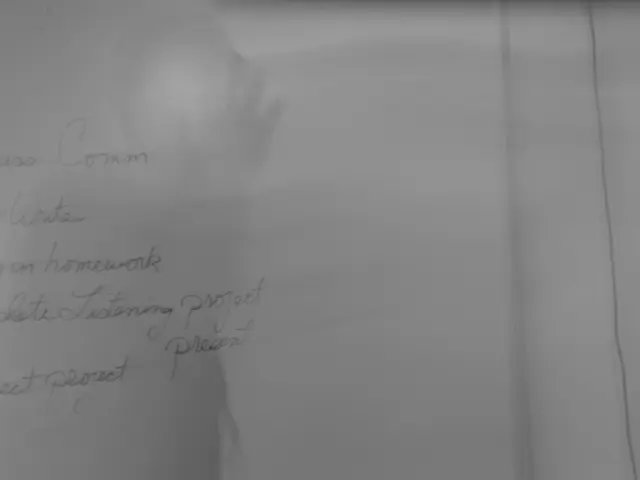Forever-lasting message by Margot Friedländer
Title: Margot Friedländer: The Holocaust Survivor Who Urged Humanity
Margot Friedländer, the 103-year-old Holocaust survivor, breathed her last on Wednesday. Known for her tenacious spirit, she tirelessly shared her harrowing story until the end, leaving a powerful message that echoes with urgency.
A petite woman, Friedländer stood tall, speaking in schools, at commemorative events, and public forums - always humbly, patiently, and insistent. She spoke about her family, who perished at the hands of the Nazis, her own hardships in Theresienstadt concentration camp, and most importantly, she preached "Be human."
Just days before her passing, she delivered this urgent message. Despite her frail state, her voice was still strong enough to resonate with those who listened. A Berlin honorary citizen, she had worn her humanity like a badge, serving as a symbol of hope and resilience.
Insights Friedländer's Lasting Impact Her extraordinary legacy transcends the personal hardships she endured. A steadfast advocate for human togetherness, she has been honored numerous times for her unwavering commitment. In 2011, she received the Federal Cross of Merit and, more recently, the inaugural "Special Prize of the International Peace Prize of Westphalia."
Her next recognition, the Grand Cross of the Federal Order of Merit, was to be bestowed upon her by Federal President Frank-Walter Steinmeier, but she humbly declined the honor herself. She also chose not to attend the commemoration of the 80th anniversary of the end of World War II.
Insights A Life Marred by War and Persecution At the tender age of 21, Margot, then known as Bendheim, witnessed the brutal disenfranchisement of her family under Hitler's regime. Her experiences were etched into her memory with the clarity of yesterday's events. Astonishingly, she was one of the last to have lived through it all, her story serving as a poignant reminder of the darkness humanity can inflict.
Yet, Margot lived in the present, warning against the polarization and rise of the far-right in Germany. "I don't understand much about politics," she stated in an interview, "but I always say: That's how it started back then too. Be careful. Don't let it happen again."
Insights From Hiding to Home Born in Berlin in 1921, Margot's family was already fractured when the Nazis rose to power. Tragically, her mother, Auguste Bendheim, and her brother Ralph were murdered in Auschwitz. Margot survived by hiding in various places, with the help of 16 different individuals.
Eventually, she was caught and deported to Theresienstadt. The camp was a living nightmare, a place where life and death coexisted in a cruel balance. At the war's end, she immigrated to the United States, where she lived for over 50 years with her husband Adolf Friedländer.
Insights Returning Home In 2003, Margot returned to Berlin for the first time since leaving as a young woman. Accompanied by filmmaker Thomas Halaczinsky, she found a new home in her old hometown, becoming an honorary citizen and captivating audiences with her powerful story. Despite skepticism from her American environment, Margot felt a deep connection to Berlin and never regretted her decision to return.
Insights A Life Dedicated to Remembrance In her Berlin apartment, nestled among numerous awards and honors, Margot continued her mission to educate and encourage others to remember. She founded a foundation to promote freedom, democracy, and education, as well as the Margot Friedländer Prize to further her message of unity and remembrance.
"What was, we cannot change, but it must never happen again," she said. "Never again should anyone be subjected to what was done to people then because people were not recognized as people."
A simple stone at Skalitzer Straße 32 in Berlin-Kreuzberg now stands as a testament to Margot's strength and resilience. It remembers her brother Ralph and her mother Auguste Bendheim, and under it reads: "survived."
Source: ntv.de, gut/dpa
- Holocaust Survivor
- Berlin
- Humanity
- War
- Germany
- Judaism
- Remembrance
- Resilience
- The employment policies in the community, as well as the nation, during the era of politics under Hitler played a significant role in Margot Friedländer's life, leading to the disenfranchisement and tragic deaths of her family members.
- Despite being one of the last survivors of the Holocaust, Margot Friedländer could not escape the chilling echoes of the past, working tirelessly to advocate for human togetherness and unity, especially in the face of rising far-right politics in Germany.
- As a survivor of the concentration camps, Margot Friedländer'sstory serves as a potent reminder of mankind's potential for inhumanity, urging people never to forget the atrocities that occurred during World War II.
- After returning to her hometown of Berlin, the Holocaust survivor Margot Friedländer dedicated her life to remembrance, establishing a foundation and a prize aimed at promoting education, democracy, and the pursuit of a unified humanity, all while her humble stone memorial stands as a symbol of her resilience in the face of adversity.








